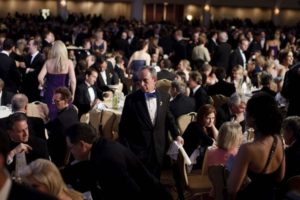Trump Snubs “Nerd Prom,” and We Should Be Grateful

Given Donald Trump’s hostility toward the press, we shouldn’t be surprised by the announcement that he plans to skip this year’s White House Correspondents’ Dinner. It’s rare for a sitting president to miss the event—the last time was thirty-six years ago, when Ronald Reagan didn’t attend because he was recovering from an assassination attempt—but it’s hard to imagine Trump spending a friendly evening with journalists he refers to collectively as the “fake news media.”
Nevertheless, we should be glad Trump declined the invitation. The annual dinner has become the kind of self-indulgent establishment orgy that reflects the sorry state of affairs in Washington today—a culture obsessed with entertainment and celebrity, the triumph of image over substance, and the degeneration of journalism, to name a few. Democracy would lose nothing with the demise of the dinner altogether.
There’s no denying that the annual event has given us some hilarious moments. In 2006 Stephen Colbert’s takedown of both George W. Bush and the Washington press corps was a defining moment in his career and, without exaggeration, a milestone in the history of subversive comedy. Never had a comic stood just feet away from the president and pummeled him so mercilessly with brutal sarcasm and wit. In character as his conservative television persona, referring to Bush and himself, Colbert told the crowd: “We get it. We’re not brainiacs on the nerd patrol…. We go straight from the gut.”
And the beating only got worse from there. When Colbert finally let up on Bush, it was only to target the privileged DC press corps. “Here’s how it works,” he told them:
The president makes decisions. He’s the Decider. The press secretary announces those decisions, and you people of the press type those decisions down. Make, announce, type. Just put ’em through a spell check and go home. Get to know your family again. Make love to your wife. Write that novel you’ve got kicking around in your head. You know, the one about the intrepid Washington reporter with the courage to stand up to the administration. You know—fiction!
Ouch. The roomful of elite media figures sat in stunned silence, but the rebuke became an instant classic.
Since Colbert’s lashing the annual dinner has become more of a high-profile affair, a much-anticipated celebrity roast for powerbrokers, and a place for movers and shakers to see and be seen. Each year, sound bites from the event are replayed on newscasts and social media in the days that follow, as we see Washington insiders yucking it up in good fun.
The problem, however, is that Colbert’s criticism of the press, while thinly guised in the context of comedy, was absolutely true and remains so. There’s something odious about journalists wining and dining in an atmosphere of elitism and privilege (there’s even a red carpet) with the very government officials they’re supposed to be covering, with movie stars and other celebrities thrown into the crowd for reasons that remain unclear.
As a former journalist, I can appreciate the value of a barstool conversation with a politician I’m charged with covering. Such relationships are valuable, and such socializing might result in information flowing my way that wouldn’t otherwise. But that’s not the kind of socializing we have with the correspondents’ dinner, where the reporters are themselves celebrities or, at the very least, celebrity wannabes, enjoying the glamour of an A-list media event that is the hottest ticket in town.
Corporate media has created an obnoxious confluence of journalism, entertainment, and politics. Such carousing can only leave us wondering whether anyone is guarding the henhouse. “All governments are run by liars and nothing they say should be believed,” said I.F. Stone, a real journalist who spent much of the twentieth century digging through public records and investigating facts to challenge official narratives. The ability and motivation of reporters to expose those lies surely becomes compromised when access to social circles is the greater goal.
“Reporters tend to be absorbed by the bureaucracies they cover,” Stone once warned. In today’s America, however, the dynamic has changed somewhat, at least at the top levels of journalism and government. Today it is the dominant media culture that absorbs both the reporters and their subjects. And neither journalism nor government is the better for it.
It’s worth noting that the New York Times has boycotted the White House Correspondents’ Dinner since the early years of Obama’s presidency. Executive Editor Dean Baquet told Lloyd Grove of the Daily Beast he felt it was “an unseemly spectacle.”
Still, there’s no question that it would be great fun to see Trump get hit with an hour or so of zingers from professional and would-be comics, then attempt to deliver his own comebacks when he is given the microphone for a few minutes. But our social media feeds will survive without those clips, and surely democracy will be all the better for it.
